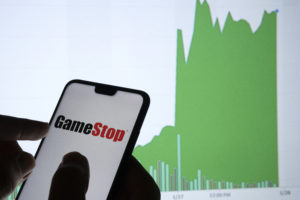I typically don’t comment on short term market fluctuations or individual stocks. Given all the chaos with GameStop (GME) stock this week, I felt it is a good time for a reminder why.
What is going on with GameStop
 Like you, I have seen and read countless news stories about GameStop recently. I haven’t seen one that mentions what you actually get when you buy a stock. It can be easy to forget but is an important place to start when trying to make sense of what is going on.
Like you, I have seen and read countless news stories about GameStop recently. I haven’t seen one that mentions what you actually get when you buy a stock. It can be easy to forget but is an important place to start when trying to make sense of what is going on.
To put it simply, what you are buying in a stock is a series of future cash flows. A stock price is investors best guess on how big those future payments will be, and how much they should be compensated for the level of risk they are taking. There are several ways to put a value on a stock, such as the Dividend Discount Model (DDM), Discounted Cash Flow Model (DCF), or comparing price-to-earning ratios to similar companies. I’ve never heard of the Reddit hype valuation method.
The past 3 years of earnings on GameStop look like this:
| Year | Earnings per Share |
| 2018 | $3.34 |
| 2019 | $2.70 |
| 2020 | $.22 |
Perhaps the simplest to understand valuation method is the Price to Earnings ratio (P/E). This tells how much we must pay (Price) to get the current profit (Earnings). Since we want to pay less money for more earnings, a low P/E ratio is better than a high one.
The P/E ratio of the S&P 500 is around 35 right now. That means if a stock earns about $1, you can expect the stock price to be around $35. Based on last year’s earnings of $.22 for GameStop and a stock price of $315, the P/E ratio is 1,431. If we apply a 35 P/E ratio we expect the price to be around $7.70. What is causing these current astronomical valuations?
In my opinion, 4 things are happening:
- Influencers have a wider audience than ever and a message that can easily spread outside that audience through social media.
- That audience has extra cash they have never invested before.
- GameStop is a company we are all familiar with. Retail investors tend to focus on companies that are consumer facing and ignore others.
- The trade was promoted and spread with the idea of “The little guy takes down billionaires”. Average Americans felt like they had a side in the “Us vs. them” contest and wanted to win.
What you should do
To be clear, none of this is intended as a recommendation to buy or sell any stock. The valuation example is simplified for illustrative purposes. I also am not a big believer in shorting stocks or trading options (betting on a stock to go down). The reason is all of these strategies are risky and get too far away from why we invest in the first place: To help you attain a reasonable level of growth on our money so that you can achieve your financial goals. I’m not willing to bet my, or anyone else’s financial futures on an unknown outcome such as what might happen with a single stock in the short term.
My message is simply that when you buy a stock, it should be done with a plan in place and not based on hype. What valuation metrics are you using? What is your exit strategy? These are all things that you should have laid out in your investment plan before you click “Trade”. If you are buying stocks without a plan in place, you aren’t investing, you are speculating. Hoping another speculative trader will buy your stock at a higher price in the future is extremely risky. When other speculators start to see prices fall, the castle can crumble much faster than you can get out.
If you insist on doing some speculative trading, I recommend using a “Core and explore” strategy. 95% of your assets should be in a core, well diversified portfolio that is designed with your timeframe and risk tolerance in mind. The other 5% can be used for more speculative investments if you have no debt and are willing to accept the risk of losing what you put in.
I believe that generally, investing should be boring. It should take a long time. If you’re looking to your investments as a source of entertainment, I’d suggest a less expensive hobby. (Maybe pick up golf?)
For those of you that may be wondering if I own GameStop myself, the answer is I do. I invest in the same diversified portfolios I create for my clients. This amounts to about 0.0000008% of my investable assets in GameStop. Which is about how much more of your time you should spend thinking about GameStop stock after reading this.




